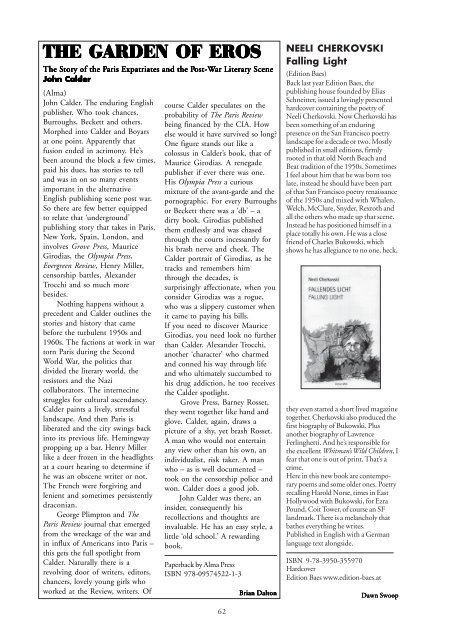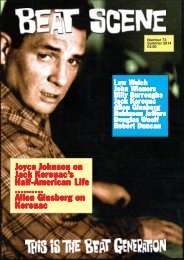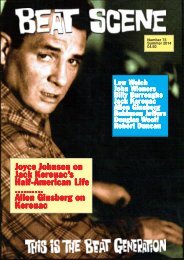You also want an ePaper? Increase the reach of your titles
YUMPU automatically turns print PDFs into web optimized ePapers that Google loves.
THE GARDEN OF EROS<br />
The Stor<br />
tory of the Paris Expatriates and the Post-W<br />
ost-War Literary Scene<br />
John Calder<br />
(Alma)<br />
John Calder. The enduring English<br />
publisher. Who took chances,<br />
Burroughs, Beckett and others.<br />
Morphed into Calder and Boyars<br />
at one point. Apparently that<br />
fusion ended in acrimony. He’s<br />
been around the block a few times,<br />
paid his dues, has stories to tell<br />
and was in on so many events<br />
important in the alternative<br />
English publishing scene post war.<br />
So there are few better equipped<br />
to relate that ‘underground’<br />
publishing story that takes in Paris,<br />
New York, Spain, London, and<br />
involves Grove Press, Maurice<br />
Girodias, the Olympia Press,<br />
Evergreen Review, Henry Miller,<br />
censorship battles, Alexander<br />
Trocchi and so much more<br />
besides.<br />
Nothing happens without a<br />
precedent and Calder outlines the<br />
stories and history that came<br />
before the turbulent 1950s and<br />
1960s. The factions at work in war<br />
torn Paris during the Second<br />
World War, the politics that<br />
divided the literary world, the<br />
resistors and the Nazi<br />
collaborators. The internecine<br />
struggles for cultural ascendancy.<br />
Calder paints a lively, stressful<br />
landscape. And then Paris is<br />
liberated and the city swings back<br />
into its previous life. Hemingway<br />
propping up a bar. Henry Miller<br />
like a deer frozen in the headlights<br />
at a court hearing to determine if<br />
he was an obscene writer or not.<br />
The French were forgiving and<br />
lenient and sometimes persistently<br />
draconian.<br />
George Plimpton and The<br />
Paris Review journal that emerged<br />
from the wreckage of the war and<br />
in influx of Americans into Paris –<br />
this gets the full spotlight from<br />
Calder. Naturally there is a<br />
revolving door of writers, editors,<br />
chancers, lovely young girls who<br />
worked at the Review, writers. Of<br />
course Calder speculates on the<br />
probability of The Paris Review<br />
being financed by the CIA. How<br />
else would it have survived so long?<br />
One figure stands out like a<br />
colossus in Calder’s book, that of<br />
Maurice Girodias. A renegade<br />
publisher if ever there was one.<br />
His Olympia Press a curious<br />
mixture of the avant-garde and the<br />
pornographic. For every Burroughs<br />
or Beckett there was a ‘db’ – a<br />
dirty book. Girodias published<br />
them endlessly and was chased<br />
through the courts incessantly for<br />
his brash nerve and cheek. The<br />
Calder portrait of Girodias, as he<br />
tracks and remembers him<br />
through the decades, is<br />
surprisingly affectionate, when you<br />
consider Girodias was a rogue,<br />
who was a slippery customer when<br />
it came to paying his bills.<br />
If you need to discover Maurice<br />
Girodias, you need look no further<br />
than Calder. Alexander Trocchi,<br />
another ‘character’ who charmed<br />
and conned his way through life<br />
and who ultimately succumbed to<br />
his drug addiction, he too receives<br />
the Calder spotlight.<br />
Grove Press, Barney Rosset,<br />
they went together like hand and<br />
glove. Calder, again, draws a<br />
picture of a shy, yet brash Rosset.<br />
A man who would not entertain<br />
any view other than his own, an<br />
individualist, risk taker. A man<br />
who – as is well documented –<br />
took on the censorship police and<br />
won. Calder does a good job.<br />
John Calder was there, an<br />
insider, consequently his<br />
recollections and thoughts are<br />
invaluable. He has an easy style, a<br />
little ‘old school.’ A rewarding<br />
book.<br />
Paperback by Alma Press<br />
ISBN 978-09574522-1-3<br />
Brian Dalton<br />
NEELI CHERKOVSKI<br />
Falling Light<br />
(Edition Baes)<br />
Back last year Edition Baes, the<br />
publishing house founded by Elias<br />
Schneitter, issued a lovingly presented<br />
hardcover containing the poetry of<br />
Neeli Cherkovski. Now Cherkovski has<br />
been something of an enduring<br />
presence on the San Francisco poetry<br />
landscape for a decade or two. Mostly<br />
published in small editions, firmly<br />
rooted in that old North Beach and<br />
Beat tradition of the 1950s. Sometimes<br />
I feel about him that he was born too<br />
late, instead he should have been part<br />
of that San Francisco poetry renaissance<br />
of the 1950s and mixed with Whalen,<br />
Welch, McClure, Snyder, Rexroth and<br />
all the others who made up that scene.<br />
Instead he has positioned himself in a<br />
place totally his own. He was a close<br />
friend of Charles Bukowski, which<br />
shows he has allegiance to no one, heck,<br />
they even started a short lived magazine<br />
together. Cherkovski also produced the<br />
first biography of Bukowski. Plus<br />
another biography of Lawrence<br />
Ferlinghetti. And he’s responsible for<br />
the excellent Whitman’s Wild Children, I<br />
fear that one is out of print. That’s a<br />
crime.<br />
Here in this new book are contemporary<br />
poems and some older ones. Poetry<br />
recalling Harold Norse, times in East<br />
Hollywood with Bukowski, for Ezra<br />
Pound, Coit Tower, of course an SF<br />
landmark. There is a melancholy that<br />
bathes everything he writes.<br />
Published in English with a German<br />
language text alongside.<br />
ISBN 9-78-3950-355970<br />
Hardcover<br />
Edition Baes www.edition-baes.at<br />
Dawn Swoop<br />
62





